Beauty and decay: inside America’s derelict movie theatres
In a new photobook, photographers Yves Marchand and Romain Meffre capture a bygone era of entertainment through decaying American movie theatres
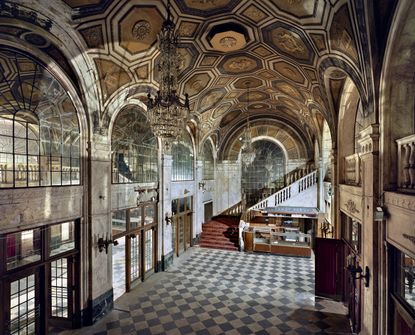
There’s something divine about decay. Traces of what once was; eras of very different social concerns, tastes and aspirations.
Movies can give us a window into the past, and as French photography duo Yves Marchand and Romain Meffre are proving, so too can movie theatres, particularly those partially chewed up by time.
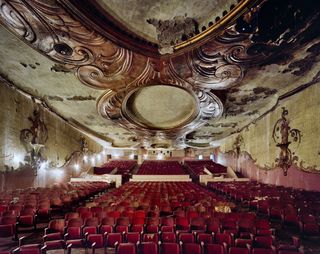
Fox Theater, Inglewood, CA.
They can still be found in many American towns; majestic shrines to film, constructed during the golden age of the entertainment. But these cinemas now stand in various states of decades-long abandonment, empty, derelict, or reborn as something else entirely. Movie Theaters, published by Prestel, is an ode to these iconic American structures, or what remains of them.
This book isn’t the duo’s first taste of tatters. They began their collaboration in 2002 by exploring Parisian remains and have published books including The Ruins of Detroit and Gunkanjima.
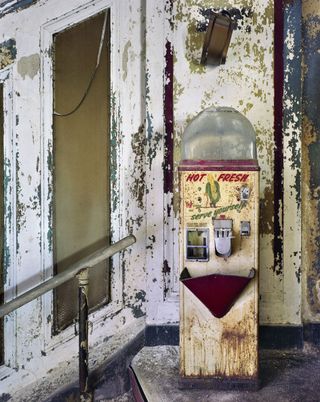
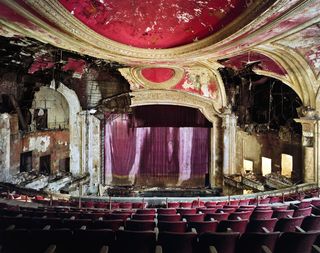
Top: Proctor’s Theater, Newark, NJ. Above: Paramount Theater, Newark, NJ.
The early 20th-century brought with it an entertainment boom. Hundreds of theatres popped up across the US, with many major movie studios commissioning architects to build extravagant, palatial auditoriums to satisfy the swelling appetites of spectators.
Since 2005, photographic duo Marchand and Meffre have travelled across America to visit these theatrical relics. In hundreds of lushly coloured images, they have captured the rich architectural diversity of the theatres’ exteriors and interiors, from neo-Renaissance to neo-Gothic, Art Nouveau to Bauhaus, neo-Byzantine to Jugendstil.
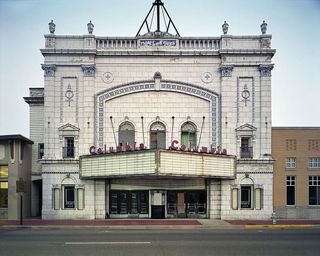
Columbia Theatre, Paducac, KY, 2011. Opened in 1927 and designed (1,200 seats) by Louisville-based architect W Earl Gore for Kentucky theatre operators Leo F Keiler and Rodney C Davis of Columbia Amusement and Realty Company. In the 1950s, it was modernised and partially remodelled in the Skouras style. In 1967, it was divided and a second screen was added on the balcony. It closed in 1987 and the asbestos fire curtain was renovated in 2013. It is currently awaiting renovation.
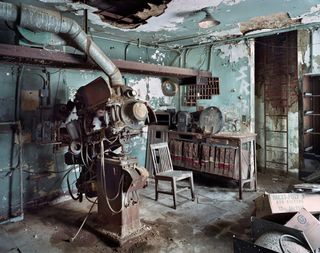
Robins Theaters, Warren, OH.
Armed with a large-format camera, they composed images spanning landscape exteriors to intimate close-ups. There’s beauty in the flaking paint, opulence in the rows of tattered crushed-velvet seats, stories retained in the defunct equipment and abandoned concession stands. Laughs, tears, screams and gasps live on in the crumbling cornices.
Wallpaper* Newsletter
Receive our daily digest of inspiration, escapism and design stories from around the world direct to your inbox.
Some sites have not been left entirely for dead. But as the 1960s matured, so too did domestic TV sets and multiplexes. During the following decades, the heyday of the movie theatre was tarnished by modernisation. These majestic buildings, in turn, began taking on less majestic roles: bingo halls, basketball courts, bus depots, warehouses, fitness centres, flea markets, car parks and retail stores.
In contemporary times, where streaming services reign and convenience outshines occasion, Marchand and Meffre’s book is not just an appetising visual record of the majestic movie palace, it’s a timely eulogy for a entertainment’s golden years. Decay, in its divinity, is evidence that things have moved on, for better or worse.
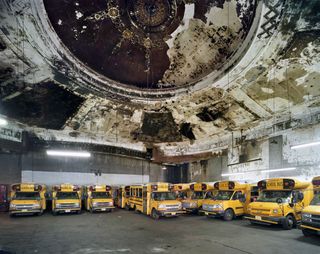
State Theater, West Orange, NJ.
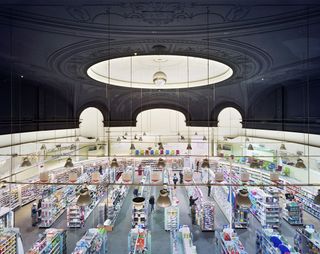
Meserole Theater, Brooklyn, NY.
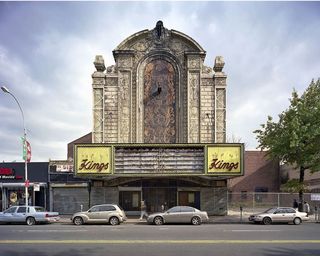
Loew’s Kings Theatre, Brooklyn, NY, 2007. Opened in 1929, designed (3,676 seats) by architects Rapp and Rapp and Edwin C A Bullock for the Loew’s Theatres chain. It was forced to close due to poor attendances in the mid-1970s and was then independently operated from 1977 as the Kings Theatre but closed just six weeks later with Bruce Lee: The Man, The Myth. It sat vacant for more than three decades until a $93m restoration started in 2010. The Kings Theatre reopened in 2015 as a performing arts venue.
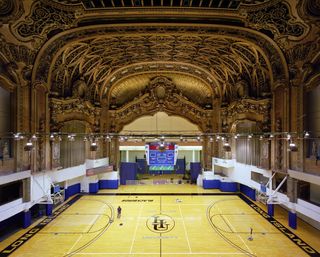
Paramount Theater, Brooklyn, NY.
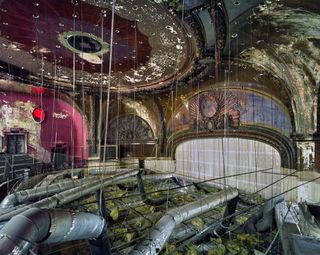
Spooner Theater, Bronx, NY.
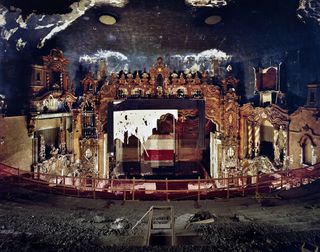
RKO Keith’s Flushing Theater, Queens, NY.
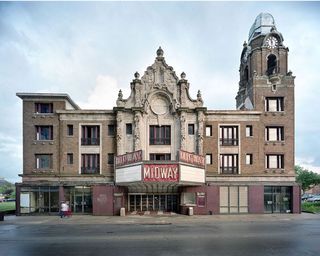
Midway Theatre, Rockford, IL, 2014. Opened in 1918, designed (1,500 seats) by architect John E O Pridmore. It was successively operated by the Ascher Brothers circuit and Balaban & Katz Corp. In 1980 a fire damaged the building, and after restoration it hosted the Rockford Symphony Orchestra, finally closing in 2006. In 2012, the roof partially collapsed. The building has since been stabilised and is awaiting renovation.
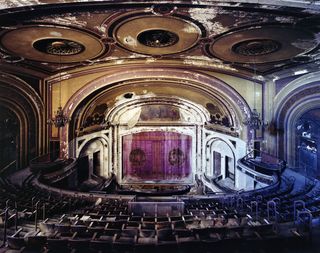
Proctor’s Theater, Troy, NY.
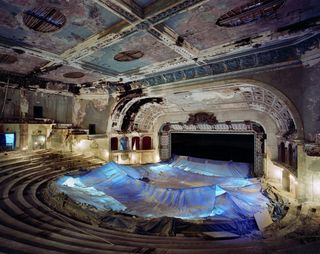
Meserole Theater, Brooklyn, NY.
INFORMATION
Movie Theaters, by Yves Marchand and Romain Meffre, £60, published by Prestel on 4 November 2021., prestelpublishing.penguinrandomhouse.de
Harriet Lloyd-Smith was the Arts Editor of Wallpaper*, responsible for the art pages across digital and print, including profiles, exhibition reviews, and contemporary art collaborations. She started at Wallpaper* in 2017 and has written for leading contemporary art publications, auction houses and arts charities, and lectured on review writing and art journalism. When she’s not writing about art, she’s making her own.
-
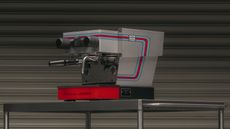 Three new coffee makers for a contemporary brew, from a casual cup to a full-on branded espresso
Three new coffee makers for a contemporary brew, from a casual cup to a full-on branded espressoThree new coffee makers, from AeroPress, Jura and Porsche x La Marzocco, range from the defiantly manual to the bells and whistles of a traditional countertop espresso machine
By Jonathan Bell Published
-
 Don't miss Luxembourg's retro-futuristic lab pavilion in Venice
Don't miss Luxembourg's retro-futuristic lab pavilion in VeniceAs the Venice Biennale enters its last few weeks, catch 'A Comparative Dialogue Act' at the Luxembourg Pavilion
By Amah-Rose Abrams Published
-
 A Berlin park atop an office building offers a new model of urban landscaping
A Berlin park atop an office building offers a new model of urban landscapingA Berlin park and office space by Grüntuch Ernst Architeken offer a symbiotic relationship between urban design and green living materials
By Michael Webb Published
-
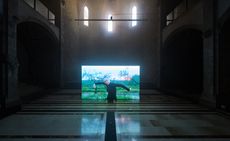 Wu Tsang reinterprets Carmen's story in Barcelona
Wu Tsang reinterprets Carmen's story in BarcelonaWu Tsang rethinks Carmen with an opera-theatre hybrid show and a film installation, recently premiered at MACBA in Barcelona (until 3 November)
By Emily Steer Published
-
 Miu Miu’s Women’s Tales film series comes to life for Art Basel Paris
Miu Miu’s Women’s Tales film series comes to life for Art Basel ParisIn ‘Tales & Tellers’, interdisciplinary artist Goshka Macuga brings Miu Miu’s Women’s Tales film series for Art Basel Paris to life for the public programme
By Amah-Rose Abrams Published
-
 Don't miss these films at the BFI London Film Festival 2024
Don't miss these films at the BFI London Film Festival 2024The BFI has announced the lineup for their 68th festival, and it's a stellar one
By Billie Walker Published
-
 Brutalism in film: the beautiful house that forms the backdrop to The Room Next Door
Brutalism in film: the beautiful house that forms the backdrop to The Room Next DoorThe Room Next Door's production designer discusses mood-boarding and scene-setting for a moving film about friendship, fragility and the final curtain
By Anne Soward Published
-
 ‘Gas Tank City’, a new monograph by Andrew Holmes, is a photorealist eye on the American West
‘Gas Tank City’, a new monograph by Andrew Holmes, is a photorealist eye on the American West‘Gas Tank City’ chronicles the artist’s journey across truck-stop America, creating meticulous drawings of fleeting moments
By Jonathan Bell Published
-
 Jobbing actors and the anxious young man: 'In Camera' on the unrelenting nature of acting
Jobbing actors and the anxious young man: 'In Camera' on the unrelenting nature of actingDirector, Naqqash Khalid’s debut feature, 'In Camera,' explores identity politics through the lens of acting
By Zoe Whitfield Published
-
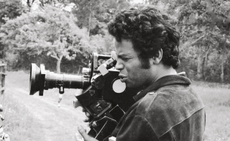 How Amy Sall is highlighting the beauty of African cinema
How Amy Sall is highlighting the beauty of African cinemaAmy Sall is highlighting the cultural impact of African filmmakers with ‘The African Gaze: Photography, Cinema and Power’, published by Thames & Hudson
By Marris Adikwu Published
-
 The Substance may be grotesque, but it is not body horror
The Substance may be grotesque, but it is not body horrorThe Substance, Coralie Fargeat's sophomore feature film, has already been granted the moniker body horror, due its visceral imagery and mutations of the body
By Billie Walker Published